Berean Bibliography: Biblical Reliability
Can you trust your Bible? Is it true that the Bible's history isn't history? Is the Bible full of contradictions? Has the text of the Bible morphed and changed through the centuries as copyists added to and subtracted from the scriptures?
Below are a list of resources that will equip you to defend the Christian faith by giving you good scholarly answers to the challenges posed by pseudo scholars and liberal skeptics. Every Christian should have these resources at their disposal and will find that their faith is built on real, verifiable history, evidence and facts.
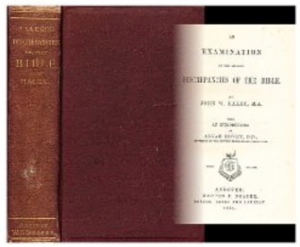 The Examination of the Alleged Discrepancies of the Bible
The Examination of the Alleged Discrepancies of the Bible
by John W. Haley — This is a classic work that carefully catalogs and debunks the so-called contradictions of the Bible that liberal and skeptical pseudo scholars love to point out. This is a free PDF download. Add it to your iBooks or Kindle library, today!
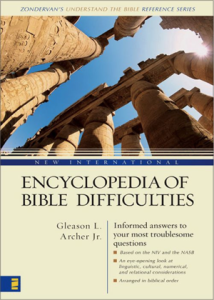 Encyclopedia of Bible Difficulties
Encyclopedia of Bible Difficulties
by Gleason L. Archer Jr. — Did God approve of Rahab's lie? Why are many of the Old Testament quotes in the New Testament not literal? Does the Bible class abortion with murder? Where did Adam and Eve's sons get their wives? Does 1 Corinthians 7:10--16 authorize divorce for desertion? What do you make of the difficult areas in the Bible---those puzzling passages that make you stop and scratch your head? The seeming contradictions and inconsistencies of Scripture actually have sound explanations. But unless you're a Bible scholar, you probably don't know about them. That's why you need the New International Encyclopedia of Bible Difficulties. It gives you informed answers to your most troublesome questions. Some of the solutions seem obvious---after you've read them. But most include an eye-opening look at linguistic, cultural, numerical, relational, and other considerations of which most Bible readers are unaware. Referencing both the New International Version and the New American Standard Bible, this helpful resource makes scholarly insights accessible to everyone. Whether you're a student, pastor, everyday Bible-lover, or even a skeptic, the New International Encyclopedia of Bible Difficulties will show you why the Bible is believable and dependable.
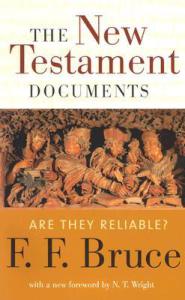 The New Testament Documents: Are They Reliable?
The New Testament Documents: Are They Reliable?
by F. F. Bruce — Because Christianity claims to be a historical revelation, says Bruce, the question of the reliability of the documents on which it was founded is a crucial one. This modern classic in the field of New Testament studies offers a compelling defense of biblical truth. F.F. Bruce, one of evangelicalism's most respected scholars, makes a clear case for the historical trustworthiness of the Christian Scriptures, drawing on evidence from the New Testament documents themselves as well as extrabiblical sources. Concise chapters explore the canon and dating of the New Testament, the nature of the Gospels (including a look at miracles), the life and writings of Paul, and archaeological and literary evidence. Including here a completely updated bibliography, Bruce's long-standing affirmation of the New Testament is still as authoritative and engaging as ever.
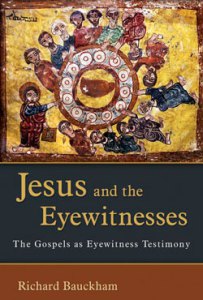 Jesus and the Eyewitnesses: The Gospels as Eyewitness Testimony
Jesus and the Eyewitnesses: The Gospels as Eyewitness Testimony
by Richard Bauckham — This book argues that the four Gospels are closely based on eyewitness testimony of those who knew Jesus. Noted New Testament scholar Richard Bauckham challenges the prevailing assumption that the accounts of Jesus circulated as "anonymous community traditions," asserting instead that they were transmitted in the name of the original eyewitnesses. To drive home this controversial point, Bauckham draws on internal literary evidence, study of personal names in the first century, and recent developments in the understanding of oral traditions. "Jesus and the Eyewitnesses" also taps into the rich resources of modern study of memory and cognitive psychology, refuting the conclusions of the form critics and calling New Testament scholarship to make a clean break with this long-dominant tradition. Finally, Bauckham challenges readers to end the classic division between the "historical Jesus" and the "Christ of faith," proposing instead the "Jesus of testimony." Sure to ignite heated debate on the precise character of the testimony about Jesus, "Jesus and the Eyewitnesses" will be valued by scholars, students, and all who seek to understand the origins of the Gospels.
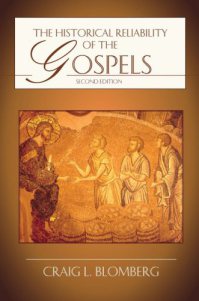 The Historical Reliability of the Gospels
The Historical Reliability of the Gospels
by Craig L. Blomberg — For over twenty years, Craig Blomberg's The Historical Reliability of the Gospels has provided a useful antidote to many of the toxic effects of skeptical criticism of the Gospels. Offering a calm, balanced overview of the history of Gospel criticism, especially that of the late twentieth century, Blomberg introduces readers to the methods employed by New Testament scholars and shows both the values and limits of those methods. He then delves more deeply into the question of miracles, Synoptic discrepancies and the differences between the Synoptics and John. After an assessment of noncanonical Jesus tradition, he addresses issues of historical method directly. This new edition has been thoroughly updated in light of new developments with numerous additions to the footnotes and two added appendixes. Readers will find that over the past twenty years, the case for the historical trustworthiness of the Gospels has grown vastly stronger.
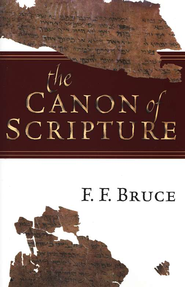 The Canon of Scripture
The Canon of Scripture
by F. F. Bruce — How did the books of the Bible come to be recognized as Holy Scripture? Who decided what shape the canon should take? what criteria influenced these decisions?
After nearly nineteen centuries the canon of Scripture still remains an issue of debate. Protestants, Catholics and the Orthodox all have slightly differing collections of documents in their Bibles. Martin Luther, one of the early leaders of the Reformation, questioned the inclusion of the book of James in the canon. And many Christians today, while confessing the authority of all of Scripture, tend to rely on only a few books and particular themes while ignoring the rest.
Scholars have raised many other questions as well. Research into second-century Gnostic texts have led some to argue that politics played a significant role in the formation of the Christian canon. Assessing the influence of ancient communities and a variety of disputes on the final shaping of the canon call for ongoing study.
In this significant historical study, F. F. Bruce brings the wisdom of a lifetime of reflection and biblical interpretation to bear in answering the questions and clearing away the confusion surrounding the Christian canon of Scripture. Adept in both Old and New Testament studies, he brings a rare comprehensive perspective to his task.
Though some issues have shifted since the original publication of this book, it still remains a significant landmark and touchstone for further studies.
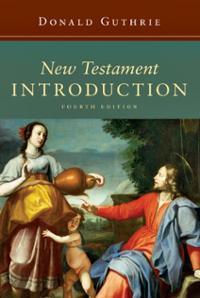 New Testament Introduction
New Testament Introduction
by Donald Guthrie — Twenty years after its first release in one volume, Donald Guthrie has revised his widely acclaimed New Testament Introduction. A careful recasting of a benchmark evangelical work, this new edition provides a fixed point for surveying the books of the New Testament. Noting the issues raised by the past two decades of biblical scholarship, Guthrie engages the issues of authorship and authenticity, purpose and structure, historical context and cultural setting. In these discussions, as well as in the notes and bibliographies, he draws on a wealth of recent scholarly research which gives added value to this classic resource.
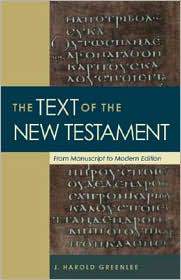 Text of the New Testament, The: From Manuscript to Modern Edition
Text of the New Testament, The: From Manuscript to Modern Edition
by J. Harold Greenlee — The Text of the New Testament is a brief introduction for the lay person into the process whereby the New Testament came to be. It describes the basics of ancient writing tools, manuscripts, the work of scribes, and how to think about differences in what the various manuscripts say. This is a revised and expanded edition with a completely new chapter on how contemporary English translations fit in with our understanding of the New Testament text. Geared to the lay person who is uninformed or confused about textual criticism, Greenlee begins this volume by explaining the production of ancient manuscripts. He then traces the history of the development of the New Testament text. Readers are next introduced to the basic principles of textual criticism, the concept of variant readings, and how to determine which variant has the greatest likelihood of being the original reading. To illustrate the basic principles, several sample New Testament texts are examined. The book concludes by putting textual criticism in perspective as involving only a minute portion of the entire New Testament text, the bulk of which is indisputably attested by the manuscripts.
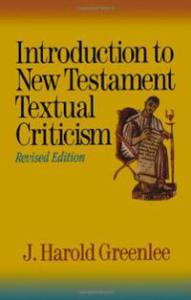 Introduction to New Testament Textual Criticism
Introduction to New Testament Textual Criticism
by J. Harold Greenlee — F. F. Bruce commented on the first edition, "I am glad to give it my warm commendation. As an introduction to the criticism of the New Testament it has . . . no equal in English." Since Bruce's comments on the original edition thirty years ago, this clear and comprehensive introduction to New Testament textual criticism has remained a popular text for beginning and intermediate students. Diagrams, an appendix of Latin terms, supplementary readings, a bibliography, and an index make this revised edition an invaluable resource.
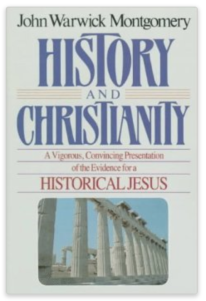 History and Christianity
History and Christianity
by John Warwick Montgomery — A stirring defense of the faith by one of Christianity's ablest defenders.
Dr. John Montgomery, scholar, theologian and apologist for the faith, developed this book from a seminar he presented at the University of British Columbia. Readable and convincing, the book is divided into four sections:
Section One deals with four basic errors usually committed by those who attack the historicity of the New Testament.
Section Two defends the accuracy of the New Testament documents, using tests which are commonly applied to any ancient document.
Section Three, entitled "God Closes In," is a powerful defense of the truly divine and truly human nature of Christ.
Section Four clearly shows that if Jesus were not the Son of God, the only other alternatives are either liar or lunatic.
The book includes the transcript of a panel discussion in which Dr. Montgomery convincingly argues from the above four points to demonstrate their application for the reader. Here is excellent material for class discussion or individual study, particularly suited to helping young people combat humanistic concepts of the Bible and Christianity.
window.amznpubstudioTag = "f4f33-20"; http://ps-us.amazon-adsystem.com/domains/extretheol-20_fe7bf632-79e7-43f8-bb82-6323d9b31607.js